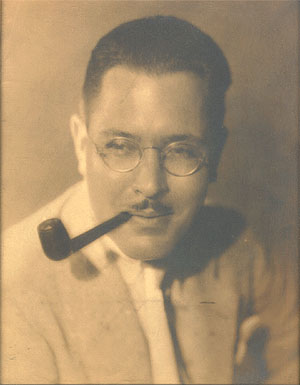
|
FATHER'S LETTERS:
What I knew of my father, as I was growing up, came from my mother and my grandmother, and their opinions
of the man weren't kind.
It wasn't until I discovered these letters that I came to know father through his own eyes. And his opinion of
himself was not a great deal kinder than theirs. He recognized that he was an alcoholic, and he saw the burden that
laid upon mother. But what he mostly saw was his great love for mother, and he was completely unable to
understand why he wasn't able to convince her of the value of that love.
From the time of their first meeting, father had loved mother with every ounce of passion in his being.
She was the most beautiful, most loving person he had ever known, besides his own mother. He threw that
great love at her with all his strength but, once she had left him, it struck against her shield of cellophane
and fell to the ground. That was one of mother's great failures - her attempt to teach me to
'wrap myself in cellophane' to avoid being hurt. Avoidance of emotional risk wasn't for me.
For the chance at great love, I was willing to risk great pain.
Mother could love as deeply as father, but her love was for her children
first and foremost. Father loved my brother, and was prepared to love me, but it was mother who filled his
heart to overflowing. But at my birth, mother had looked at her situation and asked herself how
her children would be taken care of if she was unable to do so, and her decision was born in that fear.
Standing in the train station with father,
she never let him know that she was never coming back. And with mother gone, father's world collapsed.
These letters were the cries ripped out from him as he tried to find the words to bring her back.
He never succeeded.
|
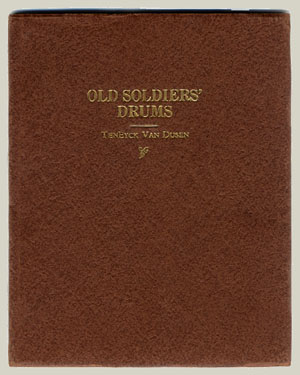
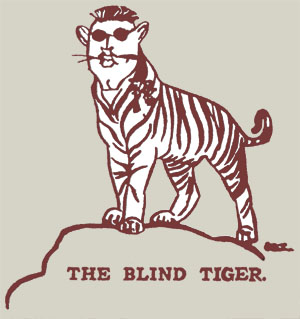
|
FATHER AND MOTHER'S POETRY:
Father was larger than life - both physically and emotionally. He projected a high energy that pulled
people to him, and he held them together with that energy. As a member of the University of Chicago
ROTC Cavalry, father came to the University as
a teacher but, in his spare time, he was a poet. The group that he put together as column contributors were
as high-spirited as he was, and when he was transferred eventually to New York City,
the group collapsed without him.
But it was there in that temporary building that father met mother over the use of a typewriter,
and where he fell in love with her. That love and his pursuit are right there in his column. If I hadn't
just spent a year trying to unmask pseudonyms for Henry Livingston, I'm not sure I would have had the
confidence to work my way through all the ones that he and mother used but, in the end,
I'm confident that I've deciphered
their story, and it brings tears to my eyes. It was, in miniature, the story of their lives.
Although he adored her from the beginning, she always held back, cool and distant, until he was finally
able to overwhelm her with his love. And, for a time, they were happy. But then you see them separating,
and father reacting with such sadness. It was almost erie, this foretelling of
the paths that both their lives would take.
Reluctant to give in to this big man, mother ultimately did and they eloped.
For six months, mother never told her parents that she was married. And when they finally did move in together,
it was in New York City's Greenwich Village, where father was, once again, the center of an enthusiastic
group of fellow revellers.
From the time I first learned of a book of father's poetry mother had given to Frank Lloyd Wright and Robert
Frost, I searched for that book. This website and my genealogy research were all done to find some
relative who might have inherited a copy. And, though the search has taken
many strange sidetrips through
history and unexpected publicity, the trip has finally ended. I have the book.
And, now, so do you.
Father:
Favorite Poems
Mother:
Chicago Sketches
|
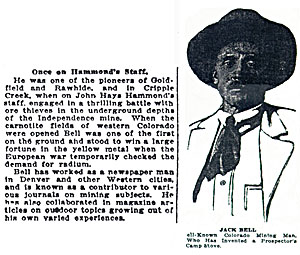
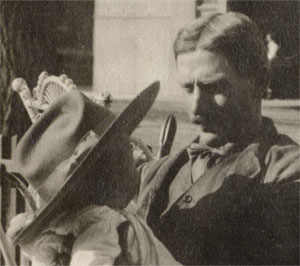

|
GRANDFATHER'S LIFE AND ARTICLES:
If I knew little of my own father, I knew almost nothing of his father. The research that had spread father's mother's world before me,
failed with the commonness of grandfather's name - Jack Bell.
There were tantalizing clues -
an obituary of father's mother that mentioned a newspaper
she published with Bell;
an article describing a gunfight in the bottom of a silver mine, as well as the mining fortunes Jack won and lost from
Alaska down to Central America; and photographs of a tall, strong man in a large cowboy hat.
But the clues led nowhere until the middle of 2012,
when a desultory search for his name returned newspaper references in archives which had
come online in the decade since I had last searched.
And were there articles!
Jack Bell was a feature writer living near Reno Nevada. Under his byline, he specialized in stories about
the intrepid new air mail pilots,
as well as stories of the nature he loved.
Like father, he drew people to him, and those people wrote about him.
Arthur Chapman: Jack Bell has walked with seeing eyes. From his own observation he has learned more of all phases of Western life than any other man I have ever known.
Gene Fowler: He is one of those genuinely he-men that seems to have the secret of youth.
Wlliam MacLeod Raine: Jack Bell is your true soldier of fortune. He has always been on the edge of civilization and beyond, tramping blithely wherever there was a promise of hardship or danger, of colorful drama in the borderlands where life was turbulent and young.
|

|
MY OWN WRITING:
I probably would have gotten into writing earlier if mother hadn't been so adamant that I was meant to
be a writer. Mother called me "Mary Contrary" for good reason. Of all the things I was sure I'd do
with my life, writing was just not one of them. I was going to be an astronomer. Or maybe work in a museum.
I did work in the museum, but only until the next Chicago election. Scientific staff at the Adler
Planetarium were political appointments. The fact that I, a fervent Republican, held that job as long as
I did was only because I had been coached by mother to identify the officeholder to whom I was connected
as a certain gentleman who had had an affair in college with one of the girls in mother's clique. I didn't
add the explanation of our connection. Obviously. Using his name proved to be good enough.
They caught me the day
after the election. I suppose that working as a Republican election judge was just a bit too blatant.
Eventually I ended up in a career in computer science, though we called it data processing back then.
Still no writing in sight. It wasn't until my fourth programming job that I found myself missing a manual,
the lack of which I corrected by writing one. Mother tried very hard not to gloat.
I did enjoy technical writing. It was satisfying to project yourself into the head of a reader
so that you could provide exactly what was needed. Minimalism and control - two qualities I've
always found challenging and fun. InterMetrics was a wonderful place to write. There were experts
behind every door who were always ready to help and explain. The customers liked the results,
and I glowed.
But it wasn't until after mother died that I put my hand to fiction. Star Trek had become my
emotional support, and I had taken to reading fan fiction like the proverbial duck to water.
And one day I found myself using it to deal with my own grief at mother's loss. I'd already learned
how to change my writing style for various types of books. Fiction was just another style.
Now instead of searching through fan fiction for writing that met my emotional needs, I could write
exactly what I needed. How perfect! My writing became a place where I'd tuck away memories though,
hopefully, only I recognized them as that. So just like wandering down my hallway and looking through
the books and thingies on the shelves for memories, I could reread pages peopled with events that I could
trust now not to forget.
In the same way that it was easy to shift from editing fan music videos to editing videos about computer projects,
I found the move from fan fiction to screenplays to be straightforward. I love a challenge, and learning a new
style is a joy. When I say something is easy, I don't mean that I don't work at it. It's just that I don't
think of the work as onerous. When I wanted to write a TV episode for Forever Knight, I recognized that it
was a completely different animal than the movie screenplay I'd learned to write. So the way I taught myself
was to buy several scripts in order to learn the names the production company used for people and places.
I didn't rely on the written script for dialog but, instead, transcribed perhaps six episodes so that I could
see exactly how each actor actually said their lines, since I was writing (I thought) for particular people. Then I
timed each piece of the episode so that I knew the variation that was acceptable in the form. Only then
did I settle down to create the detailed outline of the episode and, from there, begin to write it.
The reason the Forever Knight producer called my agent two days after my agent put the script
in the mail to him wasn't because of any
natural brilliance on my part, but because I'm not afraid of the hard, and sometimes tedious, work that unlies doing any project right.
The one form at which I still fail is the novel form. It's not that I can't write it. I can. It's just
that I hate writing it. I tried to trick myself into writing it by going back into fan fiction -
a type of writing I enjoy greatly. Unfortunately, at the end of the first chapter I couldn't keep myself
from falling back into my favorite style - something between a novel and a screenplay, with less "you are
there" and more "bat out of hell." I came back to consciousness 400 pages later, which proved to me that I can still take
on large projects, but also says that I haven't yet done the work to identify a novel variant for
myself that naturally races along.
People Magazine
Fictional Account of 'Night Before Xmas'
|
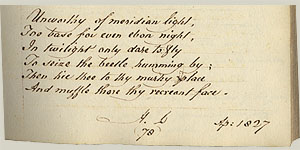
|
THE WRITING OF HENRY LIVINGSTON:
My love for Henry's poetry and prose is not so much for the period writing, but more for the character that
shines through his words. He's a good man. It's really as simple as that. And when you come away
from time spent with him, you feel good about yourself.
Witness Letters
Book and Article Sources
Moore's Poetry
|
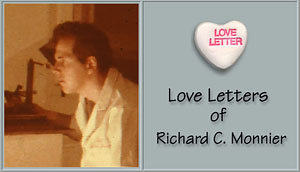
|
LOVE LETTERS:
|
I was seventeen. That says it all. We walked along Lake Michigan after the senior prom - me in a long
white gown with shoulder scarves that blew out behind, and Richard singing "Simple Gifts" from
Applachian Spring. Everyone should have some magic in their lives.
|
Poetry
|
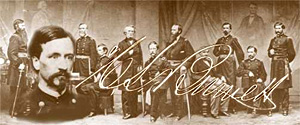
|
MEMORIES OF THE LINCOLN ASSASSINATION TRIAL:
|
Brought to D.C. by Secretary of War Stanton, then Colonel Henry L. Burnett was responsible for administrating
the investigation into President Lincoln's death, becoming a special judge advocate during the trial, and
then responsible for preparing the materials for the Library of Congress. Great grandfather, like many
other retired soldiers, spent years defending his comrades. This paper, which was published and presented
in many venues, was his defense of Judge Holt and General Hancock, as well as his memories of the trial.
|
General Henry Lawrence Burnett
Famous Jury Speech
Speech at New Albany
|
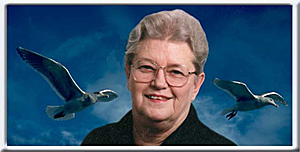
|
PAT MORSE-MCNEELEY'S POETRY:
|
Pat is one of the most amazing people I've been privileged to meet. Enthusiastic about everything,
thrilled about life, she sets high goals for herself and meets them. If a young writer ever needed a
role model, this is the one!
|
|
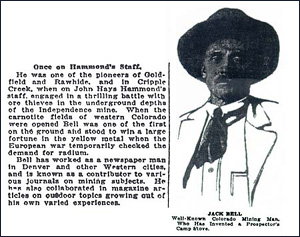
|
ANCESTRAL WRITERS:
|
If mother was right about writing being in the genes, I should take my laptop to bed and let my
genes do the writing while I get some sleep. There were so many writers, the farther back I went.
Father's parents published a newspaper in Colorado,
and wrote on the side. His grandfather was General Burnett.
Henry Livingston, his 4th great grandfather, is the argued author of the Christmas poem.
Another 4th grandfather, Colonel Edward Antill, wrote scientific papers.
His 6th great grandfather, NJ Governor Lewis Morris, collaborated with NY Governor Hunter
on Monoropolis, the first theatrical production printed in America (1714).
Father's 7th great grandfather, Reverend John Livingston, wrote his memoirs, and his
10th great grandfather, Reverend William Baudertius, was one of a small group who translated the
bible into Dutch, as well as writing poems and a Dutch history.
|
Poetry
|
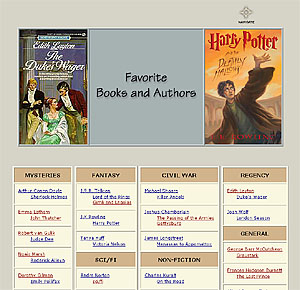
|
FAVORITE AUTHORS AND BOOKS:
We read for information and we read for emotional sustenance. Which is more important I'd have trouble
arguing. I just know that I need my books. They provide the foundation for any new enthusiasm into which
I leap, and they're the friends I rely on in the middle of the night. Most books I reread. Some, like
George Barr McCutcheon's
Graustark, and
Frances Hodgson Burnett's
The Lost Prince,
I think must be imprinted in my cells.
When you're a child becoming an independent person, books are like friends - they influence you and affect
who you will grow up to become. A good reason to surround the children you love with good literary friends.
Reading these books as an adult gives you a chance to step back and ask yourself just why this or that book was
so important to you. What did it say that you needed to hear? So books can grow with you, and give the adult
you still more things of value.
And just as books formed you, they formed your friends as well. Want to understand a friend better? Ask
them what books were important to them, and read their books with that in mind. A friend and I had a wonderful
conversation about why Frances Hodgson Burnett's Secret Garden meant so much to her, and turned me
off, while my Lost Prince had the same effect on her.
It's from books, as well as conversation, that we learn how to communicate. I've learned to change writing
styles over the years, but I can still see much of what has become my natural style in those early turn of the century books
mother shared with me when I was young.
|
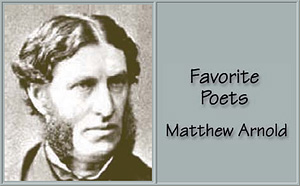
|
FAVORITE POETS:
When I ran short of library books as a child, I would fall back on the books in our living room
that had belonged to my grandmother and mother. The many poetry books weren't the most exciting reading,
but I did acquire a small poetic education. Yet looking back on my grammar
school years, one of the most persistent memories is of the poetry I was required to memorize, and
which I learned to love.
The boys
I cared about in high school were both fond of poetry, too, and there were mornings when I would find
on the doorstep a flower, or a poem or a piece of classical music that George had left with great kindness.
And I can remember long walks
with Richard during which he recited to me the poetry of Matthew Arnold
or poems he had written himself.
|






















![]() Copyright © 2007, Mary S. Van Deusen
Copyright © 2007, Mary S. Van Deusen